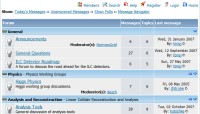 |
 |
|||||||||||||
|
|||||||||||||
|
|||||||||||||
|
Many scientists working on ILC detector simulation know: Mokka can give you sleepless nights. This has nothing to do with caffeine, however - Mokka is a software that lets you run full simulations of events in future ILC detectors. It uses the Geant4 simulation tool, and ILC detector people around the world use it – and struggle with it sometimes. If you’re one of those people and are looking for answers (or maybe you want to share a particularly interesting line of code?), the website forum may be the right place for you. The forum was created by Norman Graf (SLAC) and Ties Behnke (who was at SLAC on a sabbatical from DESY) in 2003 as a means to share information and problems without flooding email inboxes. It is now run by Tony Johnson and Norman Graf, and at the moment is mainly used by the ILC's software community. Norman Graf remembers how it all started at the time when there was no ILC yet: “Even though a number of groups were competing for the design of the accelerator (NLC, JLC and TESLA), we felt that the physics and detector communities could best make progress by not tying ourselves to any particular machine. Even at that time there were many different mailing lists but there was not a common, single point of contact.” What they needed was public access to all information, an archive and topics threaded by context and time of submission, and Tony Johnson proposed to use an open source project called FUDforum. An email to all regional mailing lists went out in March 2004 announcing the birth of the forum. Currently there are spaces for general announcements, physics, analysis and reconstruction, detector-development, machine-detector interface and many more. Many topics have regular traffic, other have been asleep for three years - you can easily see how active a topic is by checking when the last message was posted. The interface also tells you how many posts there are and who wrote the last one - all forum participants are identified by a username. There are 241 registered users who have posted a total of 1104 messages in 47 forum areas. “We would welcome a wider user base and are happy to help in setting up new forum areas,” says administrator Tony Johnson. Posting a question or a reply is easy: You simply register, find the right topic (or create a new one), type in your text and it appears. Moderators make sure that users stick to the etiquette. You don't need to register to read the posts. The forum has a search function (which you are advised to use before posting anything), and lets you subscribe to topics, meaning that you can, but do not have to get an email when a new message is posted in the topics that interest you. “I like the forum as a source for finding solutions to software problems,” says Oliver Schäfer from the university of Rostock in Germany who works on TPC prototypes for future ILC detectors. “I would like to use it for discussions on detector problems and progress as well, so it is a pity that it is almost exclusively used by the software people now.” According to Schäfer the advantages of the forum are that the topics are very well organised and minimises email floods in your inbox because you can choose which discussions to follow. “The forum structure makes it a better tool for knowledge-based exchange, communication and discussion than usual mailing lists.” -- Barbara Warmbein Click here if you want to find out more about how to use the forum or contact Tony and Norman at forum@linearcollider.org if you would like to create new ILC-related forum topics. |
|||||||||||||
| © International Linear Collider |
